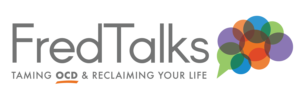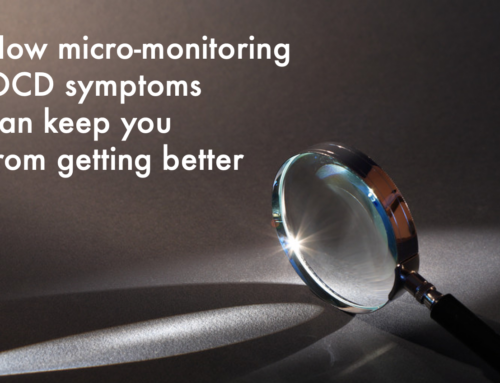 Is your brain deceiving you? If you have OCD, you’ll probably say yes, at times, your brain does like to deceive you. But you may be unaware that your brain’s deception can go far beyond OCD.
Is your brain deceiving you? If you have OCD, you’ll probably say yes, at times, your brain does like to deceive you. But you may be unaware that your brain’s deception can go far beyond OCD.
For instance, have you ever had thoughts like these?
- I’ll never be able to live a normal life like everyone else because of OCD.
- I’m a misfit because I have OCD.
- ERP therapy for OCD may work for other people, but I bet it’s not going to work for me.
- I have OCD, and therefore I’ll never be truly happy.
When thoughts like those enter your mind, what do you do with them? 1) Ignore them and move on with your day? 2) Ponder them and try to figure out whether they are true? 3) Or do you accept them as facts and then change your behavior as a result?
The price of deception
In my friend Dr. Ashley Smith’s new TEDx Talk, “Is your brain deceiving you?” she shares how many of us—herself included—get trapped doing #3: creating dark, sticky narratives that negatively impact how we view our lives.
Ashley doesn’t have OCD, but she does have a rare degenerative retinal disease that has left her legally and increasingly blind. And her mind told her fictions not dissimilar from those 4 bullet points above about what having this condition was going to mean for her, now and in the future. Here, take a few minutes for yourself to hear what she has to say:
Build belief through behavior
As you heard, Ashley learned that the most powerful strategy for revising our mind’s fictions is building belief through behavior:
“Rather than mistaking fictions for facts and blindly following our mind’s directives, we have to defy them. We must test out their assumptions, daring our brains to prove it, and in doing so, we create new experiences and uncover new facts. That’s what happened for me.” Dr. Ashley Smith
To see how this works, let’s take the first of those stickily deceptive thoughts above, “I’ll never be able to live a normal life like everyone else because of OCD” and walk through how Ashley’s strategy might play out. First, we could make a list of what things might constitute a “normal” life, so we know what we’re heading toward. For instance, maybe one of the things on the list is getting coffee at the local coffee shop in the morning. Then, because our brains are telling us we can’t do that, we’re going to defy our brains and go do it anyway! Now, it might be hard, we might have to employ all our ERP skills to do it, and we might slip and do a compulsion or two, but hey, we’d be going to the coffee shop, creating a new experience in our morning routine and uncovering a new fact: we can do things that are part of a “normal” life!
And we’d do this over and over again for each of our mind’s fictions—very much like we’d do in ERP practice—to teach our brains and ourselves that we can, as Ashley says, “start living our new story.”

Learn more about Dr. Ashley Smith and Peak Mind
Ashley has been a true gift in my life. Literally. She was “given” to me as a mentor for winning a professional organization award a decade ago, but our relationship quickly progressed from mentor/mentee to close friends and traveling companions. I’ve learned so much from her over the years, and now you can, too, by signing up for her Peak Mind newsletter, reading her guest post on my website, “I see your pain,” or by visiting her website.
Learn more about taming OCD
I’m grateful that Ashley has always been one of the biggest supporters of my memoir, saying “Is Fred in the Refrigerator? is a masterfully written memoir-meets-educational-meets-inspirational tale that I couldn’t put down.” Click here to purchase your copy.
Sign up for my Shoulders Back! newsletter to receive OCD-taming tips & resources, including notifications of new blog posts, delivered every month to your inbox.
My blog posts are not a replacement for therapy, and I encourage all readers who have obsessive compulsive disorder to find a competent ERP therapist. See the IOCDF treatment provider database for a provider near you. And never give up hope, because you can tame OCD and reclaim your life!







Leave A Comment